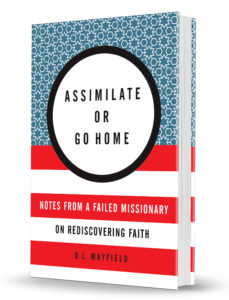
The amazing DL Mayfield’s book, Assimilate or Go Home, releases next week, and I am SO EXCITED. I wanted to participate in her celebration of the book’s themes and of her work. Anyway, I’ve started to read the book; it’s a must for anyone who wants to know who their neighbor is, and how to love him or her. Go pre-order it here!
In honor of the release, I’ve written my favorite unrecognized ministry: the ministry of my incompetence.
Here’s what I didn’t want to happen when I hosted my women’s small group for dinner at my house: I didn’t want everyone to leave before I served the food. I also didn’t want to end the night crying at my kitchen counter, the sausages congealing, uneaten.
That would have been a dinner party nightmare. Which is what I thought as I cried: This is a dinner party nightmare.
I have a lot of anxiety about dinner parties at the best of times. They fill me with jittery stage fright.
And this particular small group felt even more high-stakes. I hosted the women from the Spanish-language Bible study I’ve been involved with for four years. Dinner party + cultural, language, class and ethnic barriers = recipe for supreme nerves.
There’s also the fact that these sisters—from various countries in Latin America—have modeled to me the spirit and art of Latina hospitality. They know how to treat guests. They serve amazing food from their home countries. They wait for latecomers and accommodate extra guests with cheerful aplomb, prioritizing people over schedules and expectations.
I—well, these are not my spiritual gifts.
I love my Bible study. I love the women, their stories, their insight into the Bible. I love the diversity of the group—different countries, cultures, backgrounds, and educational levels. I love the food. I love speaking Spanish, which became my heart language while I lived abroad. I love the laughter. I love how they welcome me, kindly, patiently, wholeheartedly.
But of course, my being the only gringa is sometimes awkward.
I get about one out of every ten jokes, even when they explain the punch line. I am often surprised by what happens, like start times or end times, or what is polite or impolite, since I miss norms everyone else gets intuitively.
More uncomfortable is coming face-to-face with class differences in a way we don’t usually in white suburbia. I don’t like noticing that only a few of us have college degrees, or that the majority of us clean houses for a living, or that I’m probably the wealthiest one. I notice, and I assume others do too. That makes me feel weird.
And weirder: I hate discovering my racist assumptions, week by week. For instance, I was surprised that so many of the women were into natural health remedies and gluten-free diets. Then I noted my surprise, and winced. Do really assume only wealthy white women shop at health food stores?
Still, though, this particular night wasn’t awkward in a “confronting barriers that Christ calls me to” kind of way. It felt awkward like a disaster.
It seemed to go fine at first. In my dining room, we read from the Word of God and discussed the book we were reading. We prayed. And then—after some conversation and laughter, everyone got up and left.
They left. Despite the fact that all the food was sitting on the counter in the kitchen, clearly ready to eat. Despite the fact that I’d gotten up several times to get the sausages out of the oven, pull out plates and prepare for the meal. Despite the fact that several of the women had been in the kitchen and seen the food.
When the last lady left, I cried. I felt ashamed: had they not liked the look of my meal? Had they decided it was better to leave than eat?
But after a few minutes of tears, I sat up, and tried to take stock. It was out of character for these women to reject me, and even more unlikely that they’d reject hospitality. So was there any other explanation?
And as I thought about the night, I realized I had never actually invited them to eat.
This seems like a no-brainer. An obvious thing. But honestly, the protocol for every Bible study had mystified me like the jokes did. I always missed when the hostess cued everyone to serve themselves food. It was like a cue in a dance—unspoken, and clear to everyone except me.
I’d assumed they would see the food I’d put out in the kitchen. I’d assumed someone would ask when we would eat. I’d assumed it would be obvious I would serve food.
But was it? After all, everyone had left. And I watched them go, tongue-tied. The words to tell them the obvious—awkward words I’d struggle to find in Spanish at the very best of times—did not come.
Now, drying my eyes at my counter, I picked up a cold, forlorn sausage and ate it. I decided I needed to say something to make sure I had not inadvertently offended anyone. To figure out how to do better next time.
Luckily, the next week, my friend Lety and I were already planning to get coffee. She’d been at Bible study that night, the last to leave, smiling and gracious.
We chatted a while, and then, I cleared my throat, and spoke awkwardly in Spanish.
“Last Bible study at my house, did I mess up? I made dinner, but everyone left without eating. I didn’t say anything, because I assumed everyone knew I had food, but then you all left—“
My face flushed red as I spoke, especially when I saw the dawning horror on Lety’s face.
“Oh, no! I just assumed you hadn’t cooked.”
I put my head in my hands. Of course they hadn’t. Because I, in my nervous confusion, had not made that clear.
“I’m so sorry,” she said.
“It’s okay,” I said. “I’m sorry I didn’t speak up.” I wished I could laugh, but my embarrassment felt too acute. Still, I felt relieved it had been a misunderstanding, not a snub.
A month later, we gathered for our next meeting. When I walked in, Reina—who who always made the most jokes, keeping everyone but me in stitches—turned to me with a friendly grin.
“Heather, I heard you cooked for us last month and didn’t ever serve the food. My stomach was rumbling! Next time tell us when to eat, okay?”
Everyone laughed, including me. This time, I was in on the joke.
I felt so thankful to Reina. She made my weird awkwardness funny. She joked with me like a sister does.
The day I was an incompetent hostess, I started feeling more at home in the group. I started feeling less like a guest and more like a family member. I realized that even if I made a hash of things, I could discuss it with the other women and do better next time.
When I first joined the Bible study, I had pretentions of healing some of the chasms that separate Latinos and Anglos—both at my church, with its two congregations, and in our city, whose brutal border divides us. To my chagrin, showing up month after month felt much less like finding answers to these problems, and more like acknowledging my inability to fix them.
I grew more aware of my relative wealth. More aware of my social awkwardness. More aware of my own racist assumptions. More aware of all the cultural nuances I missed. More aware at how racism and xenophobia impacted my friends. More aware of how little I could do about their pain. More aware of how stubborn big problems are.
The night my guests left hungry, I think I accepted that my discomfort was there to stay. I was always going to be anxious serving dinner; I was always going to miss important cultural cues. These women were, for the foreseeable future, going to face far more injustice than I did.
But my friendship with these women wasn’t going anywhere. If anything, my incompetence at hosting was itself a ministry: the ministry of talking honestly about mistakes, honestly about differences, and doing what we could to make things right.
 Again, please do hop on over to D.L. Mayfield’s site and check out her book. Her beautiful, compassionate stories challenge me so much—and tell me that every step forward into fear is a step into beauty and love.
Again, please do hop on over to D.L. Mayfield’s site and check out her book. Her beautiful, compassionate stories challenge me so much—and tell me that every step forward into fear is a step into beauty and love.














 Do You Wish You Could Change Your Story?
Do You Wish You Could Change Your Story?
An interesting take on social incompetencies. I often feel like I’m not getting anywhere socially, and that I will remain socially awkward, even with those I would call my friends, forever. Thank you for sharing this. I have some things to ponder on for a while. Maybe my awkwardness can be a blessing after all.
Yeah, I’m going to remain a little socially awkward forever, too. I’m finding a lot of people feel that way, though–and it’s lovely to be awkward together. It’s amazing what happens when I confess my awkwardness to my friends, and they say ME TOO. xoxox Kathy–I’m hoping you find blessing in the awkwardness.
What a beautiful, vulnerable story. We all screw up; get it ‘wrong’; misunderstand the situation… But it’s when we can own it and embrace it – even laugh at ourselves about it – that we step into a place where others can share in our common humanity x
Thank you 🙂 Yes, laughter eases my awkwardness like nothing else.
Thanks so much for sharing this. You may have made an awkward mistake but the love and friendship were still there — and that is what we all need, to know we belong no matter what. I’m so glad you could experience that with these wonderful, true friends.
Me too. It’s inevitable that we screw up–but figuring out how to keep loving one another anyway is the very foundation of our relationships.